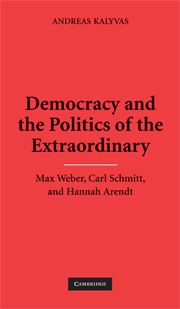Book contents
- Frontmatter
- Contents
- Acknowledgments
- List of Abbreviations
- Introduction: The Extraordinary and Political Theory
- I CHARISMATIC POLITICS AND THE SYMBOLIC FOUNDATIONS OF POWER
- II THE EXCEPTION AND CONSTITUTIONAL POLITICS
- III TAMING THE EXTRAORDINARY
- Conclusion: A Democratic Theory of the Extraordinary
- Bibliography
- Index
II - THE EXCEPTION AND CONSTITUTIONAL POLITICS
Published online by Cambridge University Press: 04 August 2010
- Frontmatter
- Contents
- Acknowledgments
- List of Abbreviations
- Introduction: The Extraordinary and Political Theory
- I CHARISMATIC POLITICS AND THE SYMBOLIC FOUNDATIONS OF POWER
- II THE EXCEPTION AND CONSTITUTIONAL POLITICS
- III TAMING THE EXTRAORDINARY
- Conclusion: A Democratic Theory of the Extraordinary
- Bibliography
- Index
Summary
Though in a Constituted Commonwealth, standing upon its own Basis, and acting according to its own Nature, that is, acting for the preservation of the Community, there can be but one Supreme Power, which is the Legislative, to which all the rest are and must be subordinate, yet the Legislative being only a Fiduciary Power to act for certain ends, there remains still in the People a Supreme Power to remove or alter the Legislative, when they find the Legislative act contrary to the trust reposed in them.…And thus the Community perpetually retains a Supream Power of saving themselves from the attempts and designs of any Body, even of their Legislators.…And thus the Community may be said in this respect to be always the Supream Power, but not as considered under any form of Government, because this Power of the People can never take place till the Government be dissolved.
John LockeThere necessarily exists, in every government, a power from which there is no appeal, and which, for that reason, may be termed supreme, absolute, and uncontrollable.…Perhaps some politician, who has not considered with sufficient accuracy our political systems, would answer that, in our governments, the supreme power was vested in the constitutions.…This opinion approaches a step nearer to the truth, but does not reach it. The truth is, that in our governments, the supreme, absolute, and uncontrollable power remains in the people. As our constitutions are superior to our legislatures, so the people are superior to our constitutions. Indeed the superiority, in this last instance, is much greater; for the people possess over our constitution, control in act, as well as right.[…]
- Type
- Chapter
- Information
- Democracy and the Politics of the ExtraordinaryMax Weber, Carl Schmitt, and Hannah Arendt, pp. 79 - 87Publisher: Cambridge University PressPrint publication year: 2008

